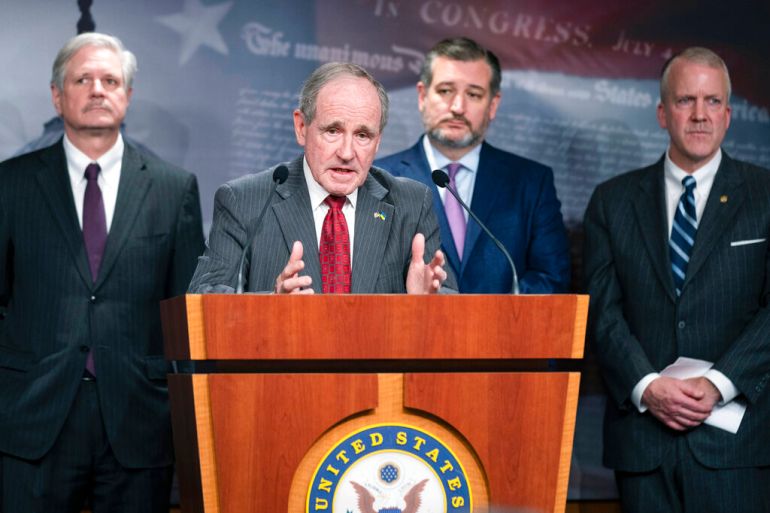US Republican senators say they will not back Iran nuclear deal
Republican lawmakers oppose, but lack power to block, an agreement with Tehran sought by US President Joe Biden.

Forty-nine of the 50 Republicans in the US Senate have announced they will not back a new nuclear deal between Iran and world powers, underscoring their party’s opposition to attempts to revive a 2015 accord amid fears multilateral nuclear talks might collapse.
In a statement on Monday, the Republican senators pledged to do everything in their power to reverse an agreement that does not “completely block” Iran’s ability to develop a nuclear weapon, constrain its ballistic missile programme and “confront Iran’s support for terrorism”.
Keep reading
list of 4 itemsIran: JCPOA agreement possible as soon as ‘red lines’ considered
Iran, IAEA hold talks as nuclear negotiations near finish line
Iran says won’t endanger national interests after Russian demand
The US has been indirectly negotiating with Iran in Vienna for months to revive the 2015 nuclear deal, formally known as the Joint Comprehensive Plan of Action (JCPOA), which saw Iran scale back its nuclear programme in exchange for a lifting of sanctions against its economy.
Former President Donald Trump withdrew the US from the deal in 2018 and Washington has been enforcing a “maximum pressure” campaign of sanctions against Tehran. In response, Iran has ramped up its nuclear programme, including uranium enrichment.
Efforts to clinch a new deal were left in limbo after a last-minute demand by Russia – now at odds with the West over its invasion of Ukraine – forced the world powers involved in negotiations to pause talks for an undetermined time despite having a largely completed text.
US lawmaker Rand Paul was the only Senate Republican who did not sign Monday’s statement. In an emailed statement, he said, “Condemning a deal that is not yet formulated is akin to condemning diplomacy itself, not a very thoughtful position.”
No congressional Republicans supported the 2015 nuclear agreement between Tehran and the so-called “P5+1” countries, the five permanent members of the UN Security Council – the US, UK, Russia, China and France – plus Germany. A handful of Democrats also objected.
US Deputy Secretary of State Wendy Sherman said during the weekend that Biden administration officials believe an agreement is near and “we would like all of the parties – including Russia, which has indicated it’s got some concerns – to bring this to close.”
Tensions between Washington and Tehran increased after Iran launched missiles that landed at the US consulate in the Kurdish city of Erbil in northern Iraq.
“We are very concerned about what Iran is doing, but imagine these Iranians with a nuclear weapon,” Sherman said on Fox News.
“We need to get that off the table so we can address their malign behaviour in the Middle East, and we will do all of the above, but first we’ve got to get this deal. And it is not yet closed.”
The 2015 Iran Nuclear Agreement Review Act gives Congress the right to review an agreement, but lawmakers are unlikely to be able to kill a deal outright after failing to do so in 2015 when Republicans controlled Congress.
Democrats now hold slim majorities in both the House of Representatives and Senate and are unlikely to turn against Biden in sufficient numbers to stop a major initiative like an Iran deal.
Nevertheless, the Republican opposition ensures Congress cannot adopt any nuclear agreement with Iran as a permanent treaty, which requires a two-thirds vote in favour, rendering it vulnerable to abandonment by a future Republican president.
A spokesperson for Iran’s foreign ministry said on Monday that Washington needs to decide to wrap up a deal.
US Under Secretary of State Victoria Nuland told the Senate last week that Russia was trying to “up the ante” by tying the Iran negotiations to Moscow’s demands in Ukraine but the US was rejecting that. “We are not playing ‘Lets make a deal’,” Nuland said at a Senate hearing.